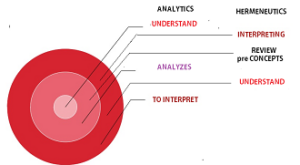
What is understanding
Understanding has become in the Western analytic structure a vicious circle that tends only to repeat what it considers to be true starting from some historical aphorism, what Gadamer calls romantic historicism in his criticism of Dilthey.
vicious circle that tends only to repeat what it considers to be true starting from some historical aphorism, what Gadamer calls romantic historicism in his criticism of Dilthey.
The forgetting of being ignores that the hermeneutic circle that goes from interpretation to a new understanding is the very structure of a new sense, a sense of existence, which is in Being.
Thus, the circularity of understanding is not primarily a logical requirement, based on an A or B method, but the ontological unfolding itself: “Heidegger’s hermeneutic reflection has its high point not in the fact that it demonstrates that a circle is present here, but a circle this has a positive ontological meaning” (GADAMER, 2013, p. 355).
Heidegger (2014), in his magna work Ser e Tempo, elaborated a hermeneutics of facticity based on the temporal analysis of human existence (Dasein), here facticity is the way of being in his Dasein that finds, in temporal existence, the possibility of revelation, of clearing:
“The structure of temporality appears as well as the ontological determination of subjectivity. But she was more than that. Heidegger’s thesis was that being itself is time” (Gadamer, 203, p. 345), here is the deepest essence of Heidegger’s work, which points to the hermeneutic circle:
“The decisive thing is not to leave the circle, but to enter it correctly. This circle of understanding is not an ordinary circle, in which any mode of knowledge moves, but it is the expression of the existential structure-of-previousness of Dasein itself. The circle must not be degraded into vitiosum nor be tolerated either. It shelters a positive possibility of the most original knowledge, a possibility that can only be truly realized in an authentic way, if the interpretation understands that its first, constant and last task consists in not letting the previous, the previous seeing and the preconception is given to it by occurrences and popular concepts” (Heidegger, 2014, p.433), but to address the same things.
Understanding seen in this way may seem too philosophical or a theorization about thinking, it is not, because, even in the oblivion of Being, the current frail structure of thought, this is the learning process that involves since the learning of language by a child even the most elaborate methods of discovery and innovation, or are just repetition of something already done, and thus without facticity, as it is mere repetition.
GADAMER, H-G. (2013) Truth and method Flávio Paulo Meurer, revision of the translation by Enio Paulo Giachini. 13. ed. Petropolis: Vozes; Bragança Paulista: São Francisco University Publisher, 2013.
HEIDEGGER, M. (2014) Ser e tempo Translation, organization, previous note, attachments and notes by Fausto Castilho. Campinas, SP: Publisher of Unicamp; Petrópolis, RJ: Editora Vozes, 2014.









